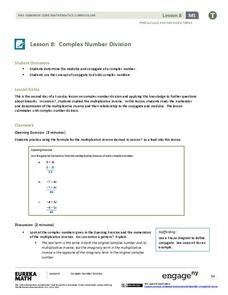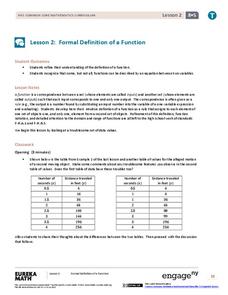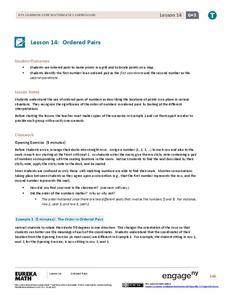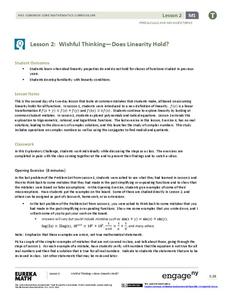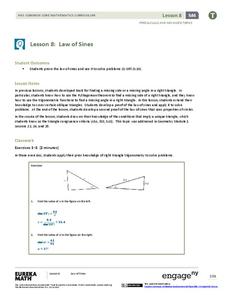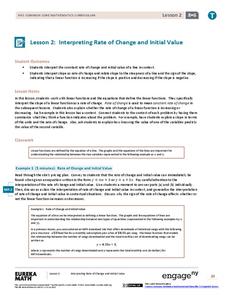West Contra Costa Unified School District
Law of Sines
One must obey the sine laws. A lesson introduces and derives the Law of Sines for non-right triangles. With examples that use the Law of Sines to determine unknown measures in triangles, the lesson checks to see if the Law of Sines also...
Curated OER
The Product and Quotient Rules
For this derivatives worksheet, students solve nine short answer problems by multiplying or dividing with derivatives. They answer one true/false question. Students solve five short answer questions.
Curated OER
Linear Approximation
In this algebra worksheet, students solve problems using estimation and the derivative. They calculate the critical points, domain and indicated intervals. They calculate the first and second derivative. There are 5 problems.
Curated OER
Exploring the Landscape
Young scholars determine the monotonicity and concavity properties of a function, then apply the First Derivative Test and draw conclusions about the first and second derivatives from these properties.
Curated OER
Calculus 10.1 - Parametric Functions
Here is a high-level, interractive presentation on calculus for your high schoolers. Parametric equations, derivatives, functions, and the Pythagorean Theorem are all part of this fine PowerPoint. Additionally, two interesting...
Curated OER
Basic Calculus: Extrema, and Optimization: Putting it all Together
In this extrema and optimization worksheet, students identify all points in the domain and determine the critical points. They compute the second derivative and find the global maxima and minima. This two-page worksheet contains two...
Curated OER
The Apple Orchard Problem
Students explore various approaches to solving a problem of maximizing the total production of apples in an orchard. In this apple orchard instructional activity, students collect data in order to solve the apple orchard problem...
Curated OER
Higher Order Differentiation and Implicit Differentiation
In this differentiation learning exercise, students calculate the first and second order derivatives and use implicit differentiation to solve 4 questions with multiple parts.
EngageNY
Complex Number Division 2
Individuals learn to divide and conquer complex numbers with a little help from moduli and conjugates. In the second lesson on complex number division, the class takes a closer look at the numerator and denominator of the multiplicative...
EngageNY
Formal Definition of a Function
Formalize the notion of a function. Scholars continue their exploration of functions in the second lesson of the module. They consider functions as input-output machines and develop function rules for selected functions.
EngageNY
End-of-Module Assessment Task: Pre-Calculus Module 2
Assess pupil understanding of the relationship between matrices, vectors, linear transformations, and parametric equations. Questions range from recall to more complex levels of thinking. Problems represent topics learned throughout the...
EngageNY
Ordered Pairs
Scholars learn to plot points on the coordinate plane. The instructional activity introduces the idea that the first coordinate of a coordinate pair represents the horizontal distance and the second coordinate represents the vertical...
EngageNY
When Can We Reverse a Transformation? 3
When working with matrix multiplication, it all comes back around. The 31st portion of the unit is the third lesson on inverse matrices. The resource reviews the concepts of inverses and how to find them from the previous two lessons....
EngageNY
Proving the Area of a Disk
Using a similar process from the first lesson in the series of finding area approximations, a measurement resource develops the proof of the area of a circle. The problem set contains a derivation of the proof of the circumference formula.
EngageNY
Mid-Module Assessment Task: Grade 8 Module 6
Make sure pupils have the skills to move on to the second half of the module with a mid-module assessment task. The formative assessment instrument checks student learning before moving on to the rest of the lessons in the unit.
Mathematics Assessment Project
Representing Polynomials
Use this complete and very detailed lesson plan to assess your students' understanding of two important behaviors of polynomials. The first is the relationship between the zeros of a polynomial function and the function's graph, and the...
EngageNY
Wishful Thinking—Does Linearity Hold? (Part 2)
Trying to find a linear transformation is like finding a needle in a haystack. The second lesson in the series of 32 continues to explore the concept of linearity started in the first lesson. The class explores trigonometric, rational,...
EngageNY
When Can We Reverse a Transformation? 2
The second lesson on finding inverse matrices asks class members to look for a pattern in the inverse matrix and test it to see if it works for all matrices. The teacher leads a discussion to refine the process in finding inverses, then...
EngageNY
Law of Sines
Prove the Law of Sines two ways. The ninth segment in a series of 16 introduces the Law of Sines to help the class find lengths of sides in oblique triangles. Pupils develop a proof of the Law of Sines by drawing an altitude and a second...
EngageNY
Interpreting Rate of Change and Initial Value
Building on knowledge from the previous lesson plan, the second lesson plan in this unit teaches scholars to identify and interpret rate of change and initial value of a linear function in context. They investigate how slope expresses...
EngageNY
Interpreting Residuals from a Line
What does an animal's gestation period have to do with its longevity? Use residuals to determine the prediction errors based upon a least-square regression line. This second lesson on residuals shows how to use residuals to create a...
EngageNY
Construct an Equilateral Triangle (part 2)
Triangles, triangles, and more triangles! In this second installment of a 36-part series, your young mathematicians explore two increasingly challenging constructions, requiring them to develop a way to construct three triangles that...
EngageNY
Base 10 and Scientific Notation
Use a resource on which you can base your instructional activity on base 10 and scientific notation. The second installment of a 35-part module presents scholars with a review of scientific notation. After getting comfortable with...
EngageNY
Building Logarithmic Tables
Thank goodness we have calculators to compute logarithms. Pupils use calculators to create logarithmic tables to estimate values and use these tables to discover patterns (properties). The second half of the lesson has scholars use given...










